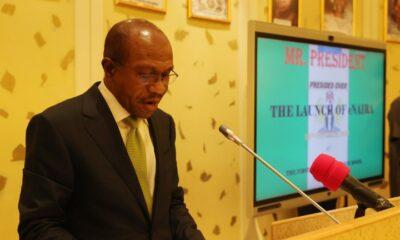The Central Bank of Nigeria (CBN) and the bankers’ committee have made move to digitize dollar sales for legitimate needs through creating an App.
Such legitimate needs include Business Travel Allowance (BTA), Personal Travel Allowance (PTA), school fees and medicals. This was the outcome of the 357th meeting of the banker’s committee meeting held virtually on Thursday.
The committee also disclosed that anyone engaged in fraudulent practices would be reported to the CBN for sanction.
“The committee discussed a number of issues, updates were provided on the State of the economy and FX policy following the stoppage of FX sales to the BDCs. There were also discussions on the ongoing rehabilitation of the National art theatre which is going to be a game-changing development to reposition the theatre to reposition Nigeria on the global tourism map,” Haruna Mustapha, CBN director of banking supervision, said while briefing journalists on the outcome of the meeting.
Segun Agbaje, Group chief executive officer, Guaranty Trust Holding Company (GTCO) Plc, who spoke on the CBN’s latest foreign exchange policy said, the new FX policy with regards to Invisibles – BTA, PTA, school fees and health is working very well.
“The banks are taking it upon ourselves along with the regulator to make sure that this works. Most of the things you are doing today involve going into the branches to do most things. We are going to try also to digitize this whole thing the way the world is going,” he said.
He said an App is being created by NIBSS where customers will be able to buy online. “You have to bring your ticket so we are sharing this information on the portal. This is very important information because if we find that people are trying to defraud the system, we will track it on the portal. The banks will report the individuals to the CBN.
“The likely punishment is that your account will be PMDied. PMD of your account means that you won’t be able to do anything in the banking system. This is for people who have genuine needs so fraudulent transactions or fraudulent individuals will be reported to the CBN and the portal will help us this,” Agbaje said.
In addition to digitizing the dollar sales, he also hopes that all the transactions will not just be cash as the world today is not completely friendly about arriving in countries with cash. “So we are hoping that people will be able to put this on a card, put it into your card account, you travel, you will use it for medical, school fees and so on,” he said.
The committee believes that most people who qualify for medical or school fees or for BTA, PTA will be people who have bank accounts and therefore encourage customers to go to their own banks because all banks are the same and customers can access BTA, PTA in their own bank.
“Progress today is very good, completely committed to doing this is for people who have legitimate needs, their needs will be met. We do not want fraudulent transactions taking place in this space and we will continue to make it quicker, faster and cheaper and more efficient by digitizing things, putting them in the cards and so on and so forth. I think that is the kind of things that we have decided around BDCs and the use of Invisibles,” Agbaje said.
Buttressing, Ireti Samuel-Ogbu, managing director of Citibank, said, there will be sanctions where people abuse the system because it is all about ensuring the foreign exchange is fairly allocated among legitimate users.
“We have digital means of being able to to determine if people are using fraudulent documentation or wanting to gain the system in a way that was not intended. We are here to support the demand, to make sure people get their foreign exchange. It is important that people realize that there is a responsibility that comes to that,” she said.
Other bank’s CEOs that spoke included Herbert Wigwe, Group managing director/CEO, Access Bank Plc, Demola Sogunle, managing director, Stanbic IBTC, Oluwatomi Somefun, managing director/CEO Unity Bank Plc, and Yemisi Edun, managing director/CEO, FCMB.
Wigwe said Banks have been criticized for not being able to handle PTA, BTA transactions. “This is just to let people know that we will continue to the due diligence required with respect to KYC compliance.
Foreign exchange is a very scarce resource if we find people trying to come up with tickets that have expired or that they are going to cancel or passports that are not legitimate by any way or people coming to buy more than they are supposed to buy using all the banks, we will report them to the law enforcement agency for them to deal with these people,” he said.






 Naira4 weeks ago
Naira4 weeks ago


 Naira3 weeks ago
Naira3 weeks ago


 News4 weeks ago
News4 weeks ago




 Naira4 weeks ago
Naira4 weeks ago


 Jobs3 weeks ago
Jobs3 weeks ago
 Naira3 weeks ago
Naira3 weeks ago


 Travel3 weeks ago
Travel3 weeks ago
 Naira3 weeks ago
Naira3 weeks ago

















